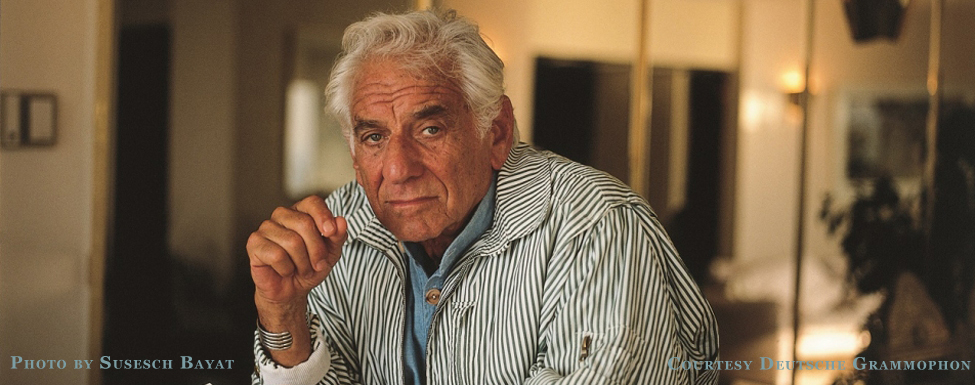Celebrating Lenny
Young lions inevitably grow old and die but when their genius shines bright their legacy lives on long after they are gone. Thus it was with Leonard Bernstein, whose memory is inextricably entwined with the history of Tanglewood.
Indeed, Tanglewood and Bernstein began their illustrious careers virtually as one. When, in 1938, the Tappan family donated 200 acres to the Boston Symphony Orchestra, making it the orchestra’s summer home, musical director Serge Koussevitzky led six concerts there to great acclaim. The feat was repeated in 1939, but by 1940 Koussevitzky had bigger dreams.
He proposed a six-week summer festival that would include an intensive music training program with Aaron Copland as composer in residence, Koussevitzky himself heading the conducting class and 29 members of the BSO coaching instrumentalists in the student orchestra.
Bernstein, then 22 and completing his first year as student at the Curtis Institute in Philadelphia, jumped at the chance. He arranged letters of introduction from influential friends and professors, including Copland. He gained a meeting with Copland in Boston and quickly persuaded the maestro to accept him into his conducting class.
Koussevitzky would become Bernstein’s mentor and champion and Bernstein would become one of Tanglewood’s shining lights. Only week’s after starting his studies with Koussevitzky, the bond was already forming. Bernstein wrote to his former piano teacher, Helen Coates, in 1940: “Koussevitzky seems to like me more all the time. He now wants me to study with him this winter in Boston. He said today that I will certainly be the greatest (!) conductor if only I will work hard 3 years—that's all. He wants to mold me, etc. He says I have everything for it … .”
When the glorious summer was over, Bernstein wrote to Koussevitzky expressing his joy and appreciation. “This summer to me was beauty—beauty in work, and strength of purpose, and cooperation,” he wrote. “I am full of humility and gratitude for having shared so richly in it. These last six weeks have been the happiest and most productive of my life. I have been able, for the first time, to concentrate completely one my main purpose, with a glorious freedom from personal problems.”
It was an expression of gratitude that would be echoed many times in coming years as Bernstein’s own proteges wrote to him. In 1977 a young flutist wrote, “I can't thank you enough for enabling me to go to Tanglewood this summer. It has been one of the most important summers of my life, because I was able to concentrate fully on music without the outside pressures of the Real World.”
Only two years after meeting Bernstein, Koussevitzky appointed him as his assistant, placing him on the Berkshire Music Center’s faculty, a status he maintained and cherished until his death.
Bernstein taught and performed at Tanglewood virtually every summer for 50 years where he forged and nurtured some of his most enduring friendships and collaborations. It was at Tanglewood in 1990 that he conducted his last concert, giving Beethoven’s Seventh Symphony his usual dynamic interpretation even as he gasped for breath throughout. Two months later, at the age of 72, years of heavy smoking caught up with him and he died from emphysema, pulmonary infections and a pleural tumor.
The old lion was dead, but not his memory or his influence. Each year since, Tanglewood has honored his lifetime of achievement with a memorial concert and this year, on the 100th anniversary of his birth, that honor has been expanded throughout the season.
Concert works by Bernstein will be presented on July 15th, (Chichester Psalms), July 21st, (alil for flute and orchestra); August 4th, (Songfest); August 18th, (Serenade, after Plato's Symposium) and the BSO-commissioned Divertimento for Orchestra, also on the 18th.
Other performances include the operas Trouble in Tahiti, July 12th, and A Quiet Place, August 9th. The Broadway hit, On the Town is slated for July 7th, the ballet score for Facsimile July 23rd; Candide August 22nd and 23rd, the ballet, Fancy Free in collaboration with the Boston Ballet on August 18th, and the Oscar-winning film version of West Side Story July 28th. For the movie presentation, the BSO will play the score live as the movie is shown on large screens in high definition with the original vocals and dialogue intact.
On August 25th, Bernstein's birth-date, The Bernstein Centennial Celebration at Tanglewood, is to be conducted by BSO Music Director Andris Nelsons, Christoph Eschenbach, Keith Lockhart, Michael Tilson Thomas, and John Williams. It will feature an array of guest artists, including Audra McDonald, Midori, Yo-Yo Ma, Susan Graham, and Thomas Hampson. The BSO will be joined by members of other orchestras with which Bernstein maintained close associations.
The entire first half of the program is dedicated to selections from such brilliant Bernstein works as Candide, West Side Story, Mass, and Serenade. Music in the second half will be drawn from the classical canon dear to Bernstein's heart including selections from Mahler's Des Knaben Wunderhorn and music by Copland as well as a new work by John Williams. The finale of Mahler's Resurrection Symphony brings the program to a dramatic close.

